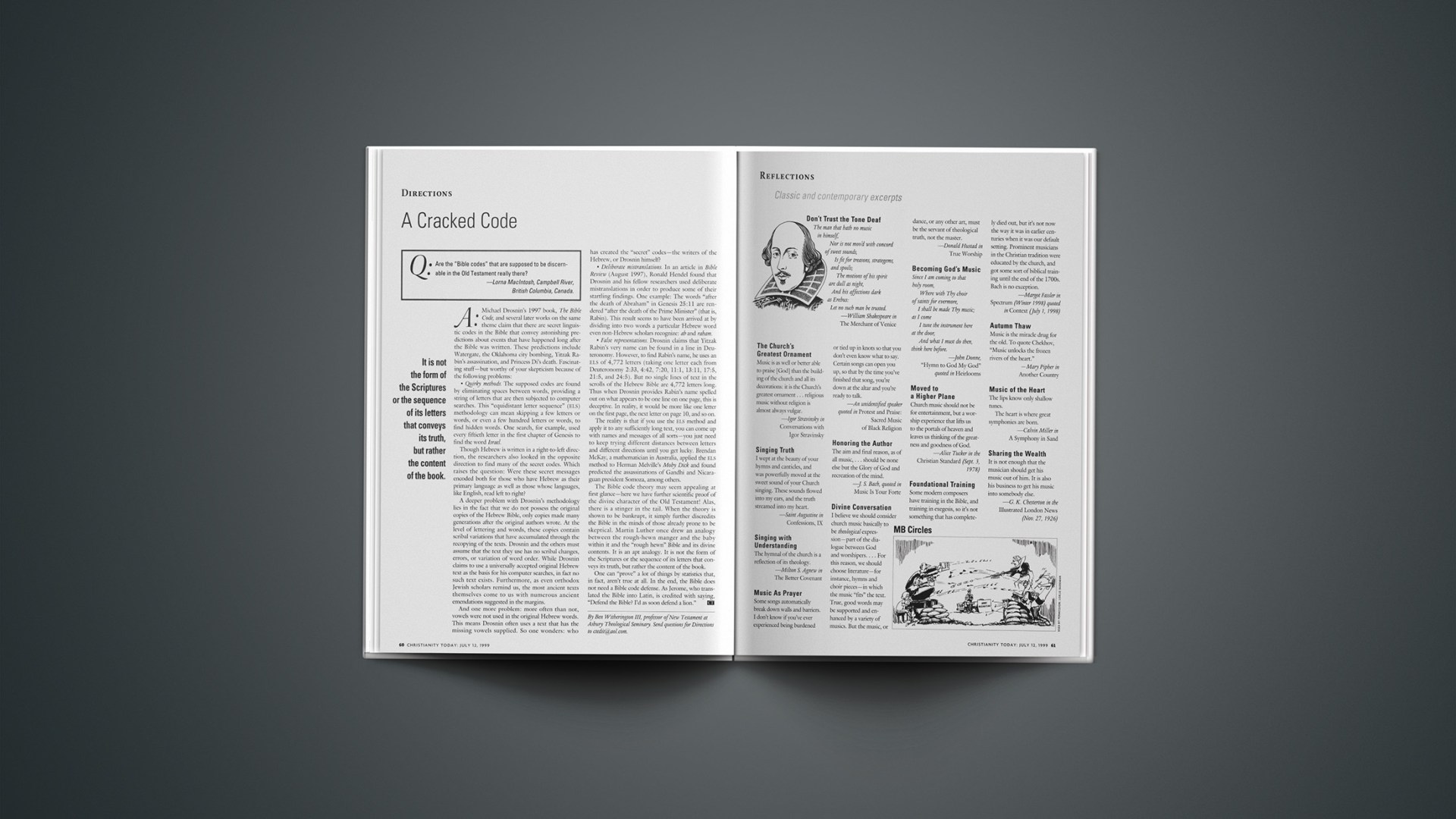Q:Are the “Bible codes” that are supposed to be discernable in the Old Testament really there? —Lorna MacIntosh, Campbell River, British Columbia, Canada.
A: Michael Drosnin’s 1997 book, The Bible Code, and several later works on the same theme claim that there are secret linguistic codes in the Bible that convey astonishing predictions about events that have happened long after the Bible was written. These predictions include Watergate, the Oklahoma City bombing, Yitzak Rabin’s assassination, and Princess Di’s death. Fascinating stuff—but worthy of your skepticism because of the following problems:
Quirky methods. The supposed codes are found by eliminating spaces between words, providing a string of letters that are then subjected to computer searches. This “equidistant letter sequence” (ELS) methodology can mean skipping a few letters or words, or even a few hundred letters or words, to find hidden words. One search, for example, used every fiftieth letter in the first chapter of Genesis to find the word Israel.
Though Hebrew is written in a right-to-left direction, the researchers also looked in the opposite direction to find many of the secret codes. Which raises the question: Were these secret messages encoded both for those who have Hebrew as their primary language as well as those whose languages, like English, read left to right?
A deeper problem with Drosnin’s methodology lies in the fact that we do not possess the original copies of the Hebrew Bible, only copies made many generations after the original authors wrote. At the level of lettering and words, these copies contain scribal variations that have accumulated through the recopying of the texts. Drosnin and the others must assume that the text they use has no scribal changes, errors, or variation of word order. While Drosnin claims to use a universally accepted original Hebrew text as the basis for his computer searches, in fact no such text exists. Furthermore, as even orthodox Jewish scholars remind us, the most ancient texts themselves come to us with numerous ancient emendations suggested in the margins.
And one more problem: more often than not, vowels were not used in the original Hebrew words. This means Drosnin often uses a text that has the missing vowels supplied. So one wonders: who has created the “secret” codes—the writers of the Hebrew, or Drosnin himself?
Deliberate mistranslations. In an article in Bible Review (August 1997), Ronald Hendel found that Drosnin and his fellow researchers used deliberate mistranslations in order to produce some of their startling findings. One example: The words “after the death of Abraham” in Genesis 25:11 are rendered “after the death of the Prime Minister” (that is, Rabin). This result seems to have been arrived at by dividing into two words a particular Hebrew word even non-Hebrew scholars recognize: ab and raham.
False representations. Drosnin claims that Yitzak Rabin’s very name can be found in a line in Deuteronomy. However, to find Rabin’s name, he uses an ELS of 4,772 letters (taking one letter each from Deuteronomy 2:33, 4:42, 7:20, 11:1, 13:11, 17:5, 21:5, and 24:5). But no single lines of text in the scrolls of the Hebrew Bible are 4,772 letters long. Thus when Drosnin provides Rabin’s name spelled out on what appears to be one line on one page, this is deceptive. In reality, it would be more like one letter on the first page, the next letter on page 10, and so on.
The reality is that if you use the ELS method and apply it to any sufficiently long text, you can come up with names and messages of all sorts—you just need to keep trying different distances between letters and different directions until you get lucky. Brendan McKay, a mathematician in Australia, applied the ELS method to Herman Melville’s Moby Dick and found predicted the assassinations of Gandhi and Nicaraguan president Somoza, among others.
The Bible code theory may seem appealing at first glance—here we have further scientific proof of the divine character of the Old Testament! Alas, there is a stinger in the tail. When the theory is shown to be bankrupt, it simply further discredits the Bible in the minds of those already prone to be skeptical. Martin Luther once drew an analogy between the rough-hewn manger and the baby within it and the “rough hewn” Bible and its divine contents. It is an apt analogy. It is not the form of the Scriptures or the sequence of its letters that conveys its truth, but rather the content of the book.
One can “prove” a lot of things by statistics that, in fact, aren’t true at all. In the end, the Bible does not need a Bible code defense. As Jerome, who translated the Bible into Latin, is credited with saying, “Defend the Bible? I’d as soon defend a lion.”
By Ben Witherington III, professor of New Testament at Asbury Theological Seminary. Send questions for Directions to cteditor@christianitytoday.com.
Copyright © 1999 Christianity Today. Click for reprint information.










